第13章 II. MIDSUMMER-DAY'S DREAM.(5)
It was a vain desire. At the front door of the apothecary's hung a thermometer, and as they entered they heard the next comer cry out with a maniacal pride in the affliction laid upon mankind, "Ninety-seven degrees!" Behind them at the door there poured in a ceaseless stream of people, each pausing at the shrine of heat; before he tossed off the hissing draught that two pale, close-clipped boys served them from either side of the fountain. Then in the order of their coming they issued through another door upon the side street, each, as he disappeared, turning his face half round, and casting a casual glance upon a little group near another counter. The group was of a very patient, half-frightened, half-puzzled looking gentleman who sat perfectly still on a stool, and of a lady who stood beside him, rubbing all over his head a handkerchief full of pounded ice, and easing one hand with the other when the first became tired. Basil drank his soda and paused to look upon this group, which he felt would commend itself to realistic sculpture as eminently characteristic of the local life, and as "The Sunstroke" would sell enormously in the hot season. "Better take a little more of that," the apothecary said, looking up from his preion, and, as the organized sympathy of the seemingly indifferent crowd, smiling very kindly at his patient, who thereupon tasted something in the glass he held. "Do you still feel like fainting?" asked the humane authority.
"Slightly, now and then," answered the other, "but I'm hanging on hard to the bottom curve of that icicled S on your soda-fountain, and I feel that I'm all right as long as I can see that. The people get rather hazy, occasionally, and have no features to speak of. But I don't know that I look very impressive myself," he added in the jesting mood which seems the natural condition of Americans in the face of all embarrassments.
"O, you'll do!" the apothecary answered, with a laugh; but he said, in answer to an anxious question from the lady, "He mustn't be moved for an hour yet," and gayly pestled away at a preion, while she resumed her office of grinding the pounded ice round and round upon her husband's skull. Isabel offered her the commiseration of friendly words, and of looks kinder yet, and then seeing that they could do nothing, she and Basil fell into the endless procession, and passed out of the side door.
"What a shocking thing!" she whispered. "Did you see how all the people looked, one after another, so indifferently at that couple, and evidently forgot them the next instant? It was dreadful. I shouldn't like to have you sun-struck in New York."
"That's very considerate of you; but place for place, if any accident must happen to me among strangers, I think I should prefer to have it in New York. The biggest place is always the kindest as well as the cruelest place. Amongst the thousands of spectators the good Samaritan as well as the Levite would be sure to be. As for a sun-stroke, it requires peculiar gifts. But if you compel me to a choice in the matter, then I say, give me the busiest part of Broadway for a sun-stroke. There is such experience of calamity there that you could hardly fall the first victim to any misfortune. Probably the gentleman at the apothecary's was merely exhausted by the heat, and ran in there for revival. The apothecary has a case of the kind on his hands every blazing afternoon, and knows just what to do. The crowd may be a little 'ennuye' of sun-strokes, and to that degree indifferent, but they most likely know that they can only do harm by an expression of sympathy, and so they delegate their pity as they have delegated their helpfulness to the proper authority, and go about their business. If a man was overcome in the middle of a village street, the blundering country druggist wouldn't know what to do, and the tender-hearted people would crowd about so that no breath of air could reach the victim."
"May be so, dear," said the wife, pensively; but if anything did happen to you in New York, I should like to have the spectators look as if they saw a human being in trouble. Perhaps I'm a little exacting."
"I think you are. Nothing is so hard as to understand that there are human beings in this world besides one's self and one's set. But let us be selfishly thankful that it isn't you and I there in the apothecary's shop, as it might very well be; and let us get to the boat as soon as we can, and end this horrible midsummer-day's dream. We must have a carriage," he added with tardy wisdom, hailing an empty hack, "as we ought to have had all day; though I'm not sorry, now the worst's over, to have seen the worst."